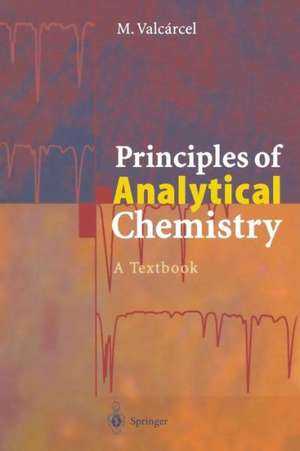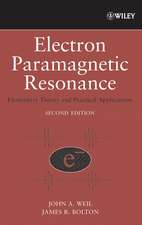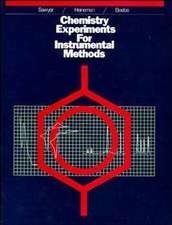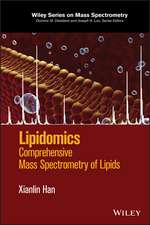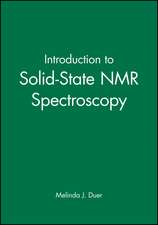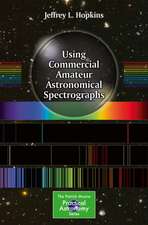Principles of Analytical Chemistry: A Textbook
Autor Miguel Valcarcelen Limba Engleză Paperback – 23 aug 2014
| Toate formatele și edițiile | Preț | Express |
|---|---|---|
| Paperback (1) | 393.74 lei 6-8 săpt. | |
| Springer Berlin, Heidelberg – 23 aug 2014 | 393.74 lei 6-8 săpt. | |
| Hardback (1) | 397.38 lei 6-8 săpt. | |
| Springer Berlin, Heidelberg – 15 aug 2000 | 397.38 lei 6-8 săpt. |
Preț: 393.74 lei
Nou
Puncte Express: 591
Preț estimativ în valută:
75.34€ • 82.17$ • 63.53£
75.34€ • 82.17$ • 63.53£
Carte tipărită la comandă
Livrare economică 24 aprilie-08 mai
Preluare comenzi: 021 569.72.76
Specificații
ISBN-13: 9783642629594
ISBN-10: 3642629598
Pagini: 392
Ilustrații: XV, 372 p. 184 illus. in color.
Dimensiuni: 155 x 235 x 24 mm
Greutate: 0.55 kg
Ediția:Softcover reprint of the original 1st ed. 2000
Editura: Springer Berlin, Heidelberg
Colecția Springer
Locul publicării:Berlin, Heidelberg, Germany
ISBN-10: 3642629598
Pagini: 392
Ilustrații: XV, 372 p. 184 illus. in color.
Dimensiuni: 155 x 235 x 24 mm
Greutate: 0.55 kg
Ediția:Softcover reprint of the original 1st ed. 2000
Editura: Springer Berlin, Heidelberg
Colecția Springer
Locul publicării:Berlin, Heidelberg, Germany
Public țintă
Lower undergraduateCuprins
1 Introduction to Analytical Chemistry.- 1.1 Analytical Chemistry Today.- 1.2 Analytical Chemical Information.- 1.3 Analytical Chemical References.- 1.4 Essential Features of Analytical Chemistry.- 1.5 Evolution of Analytical Chemistry.- 1.6 Conceptual and Technical Hierarchies.- 1.7 Classifications.- Questions.- Seminars.- Suggested Readings.- 2 Analytical Properties.- 2.1 Introduction.- 2.2 The Chemical Metrological Hierarchy: Uncertainty and Trueness.- 2.3 Errors in Analytical Chemistry.- 2.4 Capital Analytical Properties.- 2.5 Basic Analytical Properties.- 2.6 Accessory Analytical Properties.- 2.7 Relationships among Analytical Properties.- Questions.- Seminars: Numerical Problems.- Suggested Readings.- 3 Traceability: Reference Materials.- 3.1 Introduction.- 3.2 The Integral Concept of Traceability.- 3.3 Physical and Chemical Traceability.- 3.4 Types of Standards and their Traceability.- 3.5 Analytical Chemical Standards.- 3.6 Specific Meanings of Traceability.- Questions.- Seminars.- Suggested Readings.- 4 The Measurement Process in Chemistry.- 4.1 Definition of Chemical Measurement Process.- 4.2 General Steps of a Chemical Measurement Process.- 4.3 Preliminary Operations.- 4.4 Measurement and Transducing of the Analytical Signal.- 4.5 Signal Acquisition and Data Processing.- 4.6 Validation of a Chemical Measurement Process.- 4.7 Salient Current Trends.- Annex I.- Annex II.- Annex III.- Annex IV.- Annex V.- Annex VI.- Questions.- Seminars.- Suggested Readings.- 5 Qualitative Aspects of Analytical Chemistry.- 5.1 Introduction.- 5.2 The Binary Response.- 5.3 Types of Qualitative Identification.- 5.4 Standards and Calibration in Qualitative Analysis.- 5.5 Classical Qualitative Analysis.- 5.6 Instrumental Qualitative Analysis.- Questions.- Seminars.- Suggested Readings.- 6 Quantitative Aspects of Analytical Chemistry.- 6.1 Fundamentals.- 6.2 Calculable Quantitation Methods.- 6.3 Relative Quantitation Methods.- Questions.- Seminars.- Suggested Readings.- 7 The Analytical Problem.- 7.1 Introduction 283.- 7.2 Meanings of “Problem” in Analytical Chemistry.- 7.3 Integral Definition of the Analytical Problem.- 7.4 Elements of the Analytical Problem.- 7.5 Steps of the Analytical Problem-solving Process.- 7.6 Consistency Between Required Information and Supplied Information.- 7.7 The Analytical Problem in the Context of Quality.- Questions.- Seminars.- Suggested Readings.- 8 Analytical Chemistry and Quality.- 8.1 Introduction.- 8.2 A Generic Approach to Quality.- 8.3 General Aspects of Quality in Analytical Chemistry.- 8.4 Quality Systems in the Analytical Laboratory.- 8.5 Analytical Quality Control.- 8.6 Assessment of Analytical Quality.- 8.7 Supports of Analytical Quality Assurance.- 8.8 Costs and Benefits of Analytical Quality Systems.- Questions.- Seminars.- Suggested Readings.- Glossary of Terms.- Symbols and Abbreviations used in the text.
Textul de pe ultima copertă
This new, innovative textbook aims at giving the student a taste of what Analytical Chemistry essentially is, to enable him to form a picture for himself of this discipline consistent with current facts, and to meet today's demands in modern science education. Besides text, each chapter comprises information on the pedagogical objectives, on the contents, questions, seminars, and an annotated bibliography.
Caracteristici
Innovative approach to teaching Analytical Chemistry to undergraduates Contains 100 specific examples, 450 questions for students, and 27 seminars Includes supplementary material: sn.pub/extras
